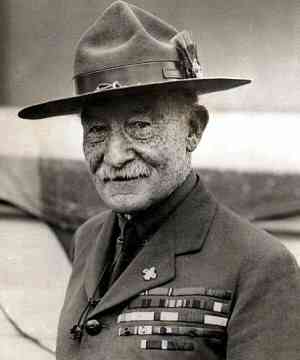Lord Baden Powell Biography
 Lord Baden Powell (1857-1941) was a British general and founder of the modern Scouting movement.
Lord Baden Powell (1857-1941) was a British general and founder of the modern Scouting movement.
He studied at Charterhouse school and served in the British army from 1876 -1910. He became a national hero during the Boer war of 1899-1900 when, with a small garrison, he commanded the defence of Mafeking.
It was during the Boer war that Baden Powell wrote down a guide to Scouting. Initially meant for military purposes, after the war he felt it could be used as a focus for young boys to give them more meaning in life.
First Scout Camp and Foundation of Scouting Movement
In August 1907, Baden Powell organised a trial scouting camp to be made up of 20 boys from a diverse social background. They spent a week on Brownsea island and it proved to be a great success.
From this initial starting point, the scouting movement soon blossomed and within a few years had become a national institution. In 1910, a parallel organisation The Girl Guides was founded, and later run by his sister. The Scouting movement also became an international phenomena with scouting groups forming around the world. Unfortunately, the First World War temporarily destroyed much of this international feeling; instead the Scouts used much of their training in the trenches on the Western Front. However, in 1920, two years after the end of the First World War, an international scouting convention was held in Olympia where Baden Powell was declared Chief Scout.
He retired from the Scouting movement in 1937, in his last letter to the Scouts, he wrote
“I have had a most happy life and I want each one of you to have a happy life too. I believe that God put us in this jolly world to be happy and enjoy life. Happiness does not come from being rich, nor merely being successful in your career, nor by self-indulgence.”
- Lord Baden Powell
Personal Life of Baden Powell
Baden Powell met his future wife, Olave St Clair Soames, on the ocean liner, Arcadian, in 1912. She was 23, he was 55. The marriage gained a lot of media publicity due to the high profile nature of Baden Powell. They were married in secret and later had three children.
Baden Powell also held some pro fascist sympathies. He read Mein Kampf in 1939 and said there were some good ideas in it. He also admired the Italian dictator Mussolini. It is said his fascism was rooted in a deep anti communist bias. His scouting movement was also black listed by Hitler and the Nazi party. In Nazi Germany, the Scouts was listed as a ‘dangerous spy organisation’.
Legacy of Baden Powell
In 2007, during the centenary of Scouting it was estimated that their were 38 million members of the Scouts and Guides in over 216 countries.
“Try and leave this world a little better than you found it and when your turn comes to die, you can die happy in feeling that at any rate you have not wasted your time but have done your best. ‘Be Prepared’ in this way, to live happy and to die happy — stick to your Scout Promise always — even after you have ceased to be a boy — and God help you to do it.”
- Baden Powell.
After retirement, in 1938, he returned to Africa where he lived at Nyeri, Kenya. He died in 1941 at the age of 83. On January 8th, 1941, at 83 years. He was buried in Nyeri in sight of Mount Kenya. On his head stone are the words “Robert Baden-Powell, Chief Scout of the World” surmounted by the Boy Scout and Girl Guide Badges.

No comments:
Post a Comment